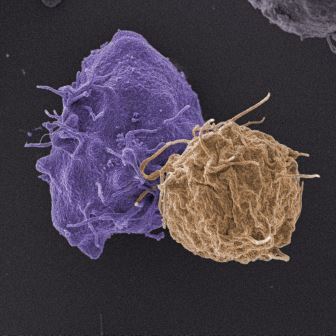 Researchers at the Royal Free Hospital are taking part in a study which will test a new approach to treating HIV.
Researchers at the Royal Free Hospital are taking part in a study which will test a new approach to treating HIV.
The RIVER study, which is now open for recruitment, is one of the first clinical trials to examine the idea of waking a ‘reservoir’ of cells infected with sleeping virus and killing them using the immune system. This idea has been called ‘kick and kill’ and this study will investigate if it might work.
HIV is a virus infection that is treatable using antiretroviral therapy (ART). ART works by stopping HIV from copying itself and thus spreading. ART reduces the amount of virus in the blood stream to such low levels that it prevents the virus from being passed on to others and gives the body’s immune system a chance to recover. But ART alone cannot cure HIV. This is because it only works on HIV infected cells that are active and most cells infected with HIV in the human body contain resting or sleeping virus. These cells represent an invisible reservoir of HIV and are one of the reasons it is so difficult to cure the infection. If ART is stopped, the virus returns. There is a strong interest among people living with HIV, as well as researchers, to look at different ways that could help to cure HIV and allow people to remain healthy without needing lifelong medication.
The RIVER study plans to test a new approach to HIV treatment, where in addition to standard ART, novel drugs are being tested to see if they can wake up or activate the HIV infected reservoir cells. The additional medication that wakes up the virus from the reservoir cells is called vorinostat. It is a drug that is usually used to treat cancer. These activated cells then need to be removed by cells of the immune system. RIVER will use two vaccines that will teach the cells of the immune system to recognise these newly activated reservoir cells and kill them.
Around 50 patients with recent HIV infection will take part in the study. There will be two groups of patients in the study – those receiving the vorinostat and vaccines alongside ART, and those receiving ART only. The study will compare the change in the size of the reservoir in these two groups.
The RIVER study is being conducted by the CHERUB collaboration, an alliance of HIV researchers at Oxford University, Imperial College London, the University of Cambridge, UCL and King’s College London. The study is funded by the Medical Research Council with support from industry partners MSD and GSK.
There are six centres participating in RIVER: the Royal Free Hospital, St Mary’s Hospital, the Mortimer Market Centre, the Royal Sussex County Hospital, Chelsea and Westminster Hospital and St Thomas’s Hospital.
“We know that targeting the HIV reservoir will be extremely difficult,” said Dr Fidler, who is leading the study at Imperial College alongside Dr Frater of the Nuffield Department of Medicine at Oxford University, who is leading the laboratory work. “Research in our labs has led to some very promising results. We now have the opportunity to translate that into a possible new treatment, which we hope will be of real benefit to patients.”
The results of the RIVER study are expected in 2018.
ENDS
Notes to editors
Media contacts: mary.mcconnell2@nhs.net or call 020 7472 6665
About the Royal Free London NHS Foundation Trust
The Royal Free began as a pioneering organisation and continues to play a leading role in the care of patients. Our mission is to provide world class expertise and local care. In the 21st century, the Royal Free London continues to lead improvements in healthcare.
The Royal Free London attracts patients from across the country and beyond to its specialist services in liver and kidney transplantation, haemophilia, renal care, HIV, infectious diseases, plastic surgery, immunology, Parkinson's disease, vascular surgery, cardiology, amyloidosis and scleroderma and we are a member of the academic health science partnership UCLPartners.
In July 2014 Barnet Hospital and Chase Farm Hospital became part of the Royal Free London. Read 'A bigger trust, a better future'.
 Translate
Translate